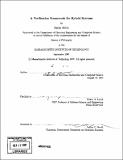A verification framework for hybrid systems
Author(s)
Mitra, Sayan
DownloadFull printable version (14.25Mb)
Other Contributors
Massachusetts Institute of Technology. Dept. of Electrical Engineering and Computer Science.
Advisor
Nancy A. Lynch.
Terms of use
Metadata
Show full item recordAbstract
Combining; discrete state transitions with differential equations, Hybrid system models provide an expressive formalism for describing software systems that interact with a physical environment. Automatically checking properties, such as invariance and stability, is extremely hard for general hybrid models, and therefore current research focuses on models with restricted expressive power. In this thesis we take a complementary approach by developing proof techniques that are not necessarily automatic, but are applicable to a general class of hybrid systems. Three components of this thesis, namely, (i) semantics for ordinary and probabilistic hybrid models, (ii) methods for proving invariance, stability, and abstraction, and (iii) software tools supporting (i) and (ii), are integrated within a common mathematical framework. (i) For specifying nonprobabilistic hybrid models, we present Structured Hybrid I/O Automata (SHIOAs) which adds control theory-inspired structures, namely state models, to the existing Hybrid I/O Automata, thereby facilitating description of continuous behavior. We introduce a generalization of SHIOAs which allows both nondeterministic and stochastic transitions and develop the trace-based semantics for this framework. (ii) We present two techniques for establishing lower-bounds on average dwell time (ADT) for SHIOA models. This provides a sufficient condition of establishing stability for SHIOAs with stable state models. A new simulation-based technique which is sound for proving ADT-equivalence of SHIOAs is proposed. We develop notions of approximate implementation and corresponding proof techniques for Probabilistic I/O Automata. Specifically, a PIOA A is an E-approximate implementation of B, if every trace distribution of A is c-close to some trace distribution of B-closeness being measured by a metric on the space of trace distributions. (cont.) We present a new class of real-valued simulation functions for proving c-approximate implementations, and demonstrate their utility in quantitatively reasoning about probabilistic safety and termination. (iii) We introduce a specification language for SHIOAs and a theorem prover interface for this language. The latter consists of a translator to typed high order logic and a set of PVS-strategies that partially automate the above verification techniques within the PVS theorem prover.
Description
Thesis (Ph. D.)--Massachusetts Institute of Technology, Dept. of Electrical Engineering and Computer Science, 2007. Includes bibliographical references (p. 193-205) and index.
Date issued
2007Department
Massachusetts Institute of Technology. Department of Electrical Engineering and Computer SciencePublisher
Massachusetts Institute of Technology
Keywords
Electrical Engineering and Computer Science.